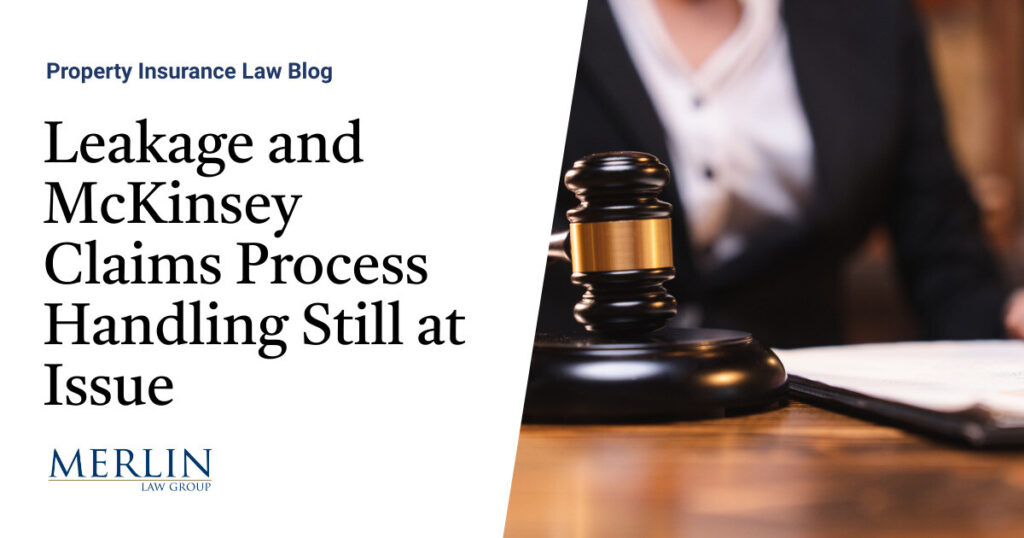Leakage and McKinsey Claims Process Handling Still at Issue

The post “Are Insurers Using “New Construction” Xactimate Settings Wrongfully Underpaying Claims?” noted that “lawsuits are starting to be filed on a more regular basis regarding State Farm’s alleged wrongful use of Xactimate to underpay claims based on ‘new construction’ settings.” One of those cases was an unsuccessful attempt to make a class action regarding various alleged wrongful claims practices.
A brief filed supporting the class determination noted, in part:
A review of CMIC’s claims sample set shows that CMIC on average pays one third less than the market price for repairs. In addition to calibrating its claims personnel to achieve consistent claims handling across all claims, CMIC also focuses its claims personnel on preventing ‘leakage’ and reducing ‘claims severity.’ Leakage and claims severity are repeatedly addressed in claims personnel’s performance reviews, and CMIC’s management training materials make clear that employee compensation is tied to performance. Class certification is proper and necessary because CMIC breaches its insurance contracts and reaps massive windfalls through the use of a few common tactics. Despite intentionally underpaying the average claim by thousands of dollars, individual litigation for most claimants is not economically feasible.
Footnotes to this paragraph stated:
CMIC along with many other large property and casualty insurers hired McKinsey & Company to redesign their claims department and turn it into a profit center. While CMIC admits to hiring McKinsey, it produced only a handful of documents regarding the McKinsey recommendations. One of those documents shows that McKinsey’s task was to ‘reduce loss overpayments’ (i.e., leakage), and that McKinsey was the source of CMIC’s ‘best practices’ which are designed to control ‘leakage.’…CMIC’s ‘best practices’ are designed to get an estimate and check into the hands of the claimant quickly, and the claim closed for the amount CMIC estimated….While CMIC’s production is missing a substantial number of documents, CMIC’s claims practices have all of the hallmarks of other McKinsey clients including Allstate’s ‘Core Claims Process Redesign’ (‘CCPR’) project in that adjusters were to be calibrated to pay claims at a level below what any of the adjusters were paying claims at prior to McKinsey; and that adjusters were to be compensated based on their ability to control claim “leakage” and severity…..
McKinsey found that the largest savings were to be found in the claims estimating portion of the claim….It can also be inferred from CMIC’s deletion of the ‘I received a fair settlement’ question from its internal customer service survey that CMIC knew the answer to the question was going to become increasingly unfavorable.
…See Ex. F [claims dept. newsletters focusing on leakage and severity]; and Ex. G [pages from performance reviews of CMIC’s claims personnel directly involved in Plaintiffs’ claim showing focus on controlling leakage and severity]. ‘Leakage’ is the term used by McKinsey and CMIC to define an ‘overpayment’ and ‘claim severity’ is simply the amount paid to the claimant.
For those trying to determine claims handling bias, the underlying reasons for claims handling processes and the culture of claims handling at a particular company, these types of internal documents are extraordinarily important.
Class action lawsuits are difficult because the first step is to certify a class of plaintiffs. In this matter, a judge refused to certify a class finding that proof of common damages, which could be measured as a class, did not exist. 1 The factual allegations were never ruled upon, although it seemed that there were significant claims processes designed to underpay claims.
For those interested, I suggest reading the policyholder’s brief supporting class certification to learn more about claims processes being supported by McKinsey & Company to help support the profitability of their insurance clients.
Thought For The Day
Over nearly a century of work, McKinsey, they argue, has been instrumental in shaping parts of American society, from offshoring to securitized debt, to CEO compensation.
—Walt Bogdanich, co-author of “When McKinsey Comes to Town”
1 Hansen v. County Mut. Ins. Co., No.1:18-cv-00244 (N.D. Fla. Aug. 8, 2024).







